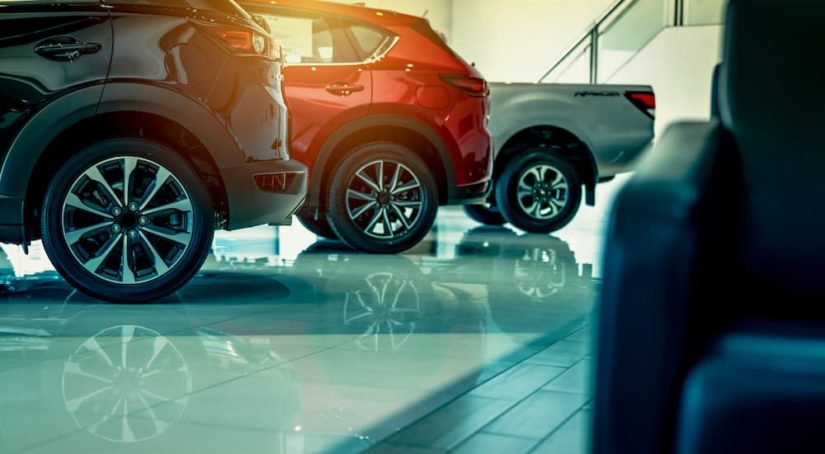When it comes to financing a vehicle, many people immediately think of new cars, but you can finance used cars, too. Depending on the value of the vehicle and how much you’ll pay when the loan is done, this could be a smart choice for some individuals. Even though you can find used cars for less than new ones, the cash value is still more than some buyers can pay in one chunk, and that’s when financing becomes a great option.
However, for many, the financing process can be overwhelming. A one-time cash payment is easy enough to understand, but once you introduce factors like interest rates, loan length, down payments, and more, it can all be a little dizzying and difficult to know if you’re getting a good deal. Keeping in mind that used cars have already undergone some depreciation, there are some considerations when it comes to financing a used car that don’t come up when buying a new car. Here is your guide to financing a used car, including the top things to consider and tips for getting the best deal.
Value vs Total Loan
You always want to think of the value of the vehicle compared to what you’ll pay in total by the time the loan is over. This becomes especially important when you’re looking at a used vehicle because it has already lost much of its value with the previous owner. Be sure to research the value of the used vehicle––the exact make and model––before looking into loans. Keep that number at the top of your mind when researching different loan options.
If the total amount you’ll pay in principle, plus interest, is significantly higher than the value of the car, that isn’t a great deal. Remember that you might re-sell the car one day, and because it will have more miles on it at that point, you’ll get much less for it than what you paid. You want to minimize your losses by avoiding taking on a loan that will be much larger than the value of the car, to begin with.
Start Early and Shop Around
Give yourself plenty of time to shop around and compare different rates from different lenders. This is particularly important when buying a used car because used cars tend to come with higher interest rates than new ones. This is because the ultimate value of the car is less predictable than that of new ones, so lenders tend to hike up the interest rates to protect themselves. That being said, depending on your credit score, down payment, and particular used model you’re after, you could see vastly different rates from various lenders, so shop around.
It’s also important to know that rates fluctuate, so if you aren’t happy with the rates you’re seeing now, wait and see if they go down. If the idea of comparing dozens of lenders and loan packages overwhelms you, consider working with a dealership. Their finance team can rapidly compare many lease and loan packages from dozens of lenders quickly, handling a lot of the research for you.
Get Pre-Approval
It is a good idea to get pre-approved before going into a dealership. This gives you a solid idea in advance of what you can afford to pay, which gives you more negotiating power. If you go in before getting pre-approved, you could go through all of the trouble of negotiating and landing on a price, only to learn that you aren’t approved for a loan of that size.
Know (and Boost) Your Credit Score
First off, know what your credit score is so that you know what you’re working with and if you need to raise it. Get your credit score in as good of standing as possible. This is important for any type of loan, but especially so for used car loans because, again, those interest rates tend to be higher. An excellent credit score can help you get the best rate on a used car loan.
There are two things you can do to improve your credit score quickly that won’t cost you any money. One is to request a higher credit limit from a credit card company of which you’re already a member. Once you get it, keep your spending the following month exactly the same so that your credit usage percentage improves. That will boost your score.
If your credit card company doesn’t increase your limit, you have another option. Ask a family member with a credit card that has a high limit, of which they use a low percentage, to add you as an authorized user. Your credit score will benefit from their good credit habits. However, if you or they have bad habits, you can bring both scores down, so you need to be responsible if this is a route you want to pursue.
Get a Co-Signer If It Makes Sense
If you’re unable to get your credit score low enough to land a great rate, consider getting a co-signer. Just remember that this person will need to have great credit and show a monthly debt-to-income that would prove them capable of making payments in case you default.
Trade-In Your Old Vehicle
If you are getting rid of an old car during this process, it’s highly advisable that you consider trading it in at the dealership that has the next car you want, as it can greatly help you finance your next vehicle. Many dealerships offer incentives and bonuses to people who trade in their cars because they want to update their used car inventory. Even if your old car is worth $7,000, for example, the dealership might throw in an extra $500 as a gift just for trading in with them. That’s an extra $500 you can put toward your next used car.
Keep the Loan Short If Possible
If possible, opt for the shortest loan available. This is how you will pay the least amount of money by the time the loan is complete. Opting for a shorter loan typically means seeing a lower interest rate (which matters in the high-interest-rate world of used cars), and it also means the loan is out of your life sooner. Many lenders will trick you into lengthier loans because the lower monthly payment is so enticing. However, if you look at the total loan amount––meaning the full dollar amount you will pay by the end of the loan––you’ll find it’s much higher for long loans compared to short loans.
Beware of Rolled In Fees
Your lender or dealership will often offer to roll your fees into your loan. These might include registration fees, sales tax, and documentation fees. Sometimes, these can amount to upwards of $500. Paying that upfront in cash can sting. However, if you add it to your loan, you could easily turn $500 into $1500 by the end of the loan. If you can pay the fees in cash, simply do so.
Short and Sweet
There is a lot to consider any time you finance a vehicle. However, it all becomes a bit more complicated when financing a used car. Taking out a loan on a used car can be a good idea if the terms are favorable, especially if you’re using the vehicle to make money through your job. It is important to know that interest rates are going to be higher when financing a used car compared to a new one, so being aware of tricks and tips to bring down your total loan payment is important. Of course, the most important thing to remember when trying to get that rate as low as possible is to keep the loan term as short as possible. If you can manage this, you could pay a great price for a sweet car that you can enjoy for many years and many miles.



